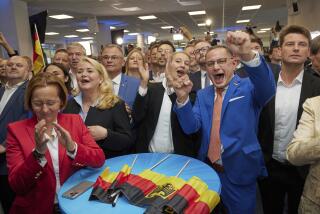PERSPECTIVE ON EUROPE : All Signs Point to an Implosion : The EC’s incompetence on Yugoslavia bodes ill for the unity treaty; in a Sept. 20 vote, France may deliver the <i> coup de grace.</i>
- Share via
PARIS — 1992 threatens to become the year of Europe’s deconstruction. January, 1993, will bring a single European Market. By then there may well have been a collapse of the European Community’s plans for monetary union and for further political and security integration.
The next four weeks will be decisive. On Sept. 20, the French public votes in a referendum to accept or reject the Maastricht Treaty on further European union. If the French vote no-- and they may--unification is finished.
Technically, the Danish public’s rejection of the treaty earlier this year made its ratification by the other 11 members of the European Community irrelevant. The ratification effort has continued, however, on the assumption that the Danes could be persuaded to reconsider. A French rejection would settle the affair.
Furthermore, it will be clear within days whether the London conference on ruined Yugoslavia has served any purpose. If it proves to have been a cynical exercise by the principal European governments and the United States, obfuscating the political and human issues at stake and producing no positive result, the plan for European political union proposed in the Maastricht agreement will be discredited. The EC will have demonstrated its political incapacity.
The outlook is very bad because both of these developments were unforeseen, and they negatively interact. Yugoslavia’s plight is a major factor in the French popular reaction against Maastricht. The public can see that the EC’s existence actually encouraged the individual governments to do little or nothing, shifting the responsibility for any serious action to the EC.
The EC in turn did little because the member governments could not agree on much beyond Lord Carrington’s useless peace conferences. Thus, the EC passed the buck to the United Nations. So much for a common European foreign and security policy.
The problem is simply that the 12 community members see things differently. Signing the Maastricht Treaty will not change that. It will make the situation worse because the treaty introduces a principle of unanimity on major decisions, which is a formula for permanent stalemate. Today, there is nothing to stop Paris or London or Bonn from taking matters into their own hands, had they a will to do so--which, as we have seen, they do not.
The French voters recognize this. It reinforces their natural reluctance to approve the surrender of sovereignty implied in the treaty, which is of a scale still unclear. The treaty’s language is legalistic and obscure, the result of a great many compromises. The sovereign principle is that of subsidiarity: that decisions will be taken in the new community at the lowest level. The meaning of this would have to be worked out in practice.
A few months ago, most voters in France would probably have assumed that good will and good sense would solve the problems that the treaty presented. In the atmosphere of European impotence and vulnerability created by the Yugoslav crisis, and the failure to do anything about it, many French are no longer willing to take on faith the community’s positive evolution.
Nor, it should be added, are many other Europeans. British skepticism about Maastricht is well known. In Germany, there is much hostility to the deutsche mark’s proposed replacement by a single European currency.
Germany is where a great many of the more than 2 million refugees created by Serbian and Croatian aggression long to go. Yet there is already a social upheaval in that country over the huge inflow of economic refugees already there, pleading political persecution. The city of Rostock has seen rioting night after night for just that reason. And while Romanians and Vietnamese can eventually be sent home as unqualified for political refuge, there is no mistaking the persecution that drove people from what used to be Yugoslavia.
French internal politics is also a factor in the referendum vote. President Francois Mitterrand unwisely chose to ask for this referendum, thinking the yes vote an easy winner, the opposition open to division on the issue, and a positive result easily interpreted as an endorsement for him. The opposition indeed has divided, but polls show the no vote marginally ahead, with the most important single motive being hostility to Mitterrand and his government.
Mitterrand supporters and conservative defenders of Europe now are allied in trying to persuade voters to save their opinions on the government until next year’s legislative election, and vote this time strictly on Europe.
But if France votes no, the shock for Europe will be profound. France and Germany made Europe. If France blocks this new program of European construction, however badly the Maastricht Treaty may have been framed, the confidence of Europeans in the future of the community will be devastated.
Last spring, all of this would have seemed implausible. One could have confidently said that the French would never vote no. Perhaps they will not. But whatever the vote, Europe is in a grave crisis, and successful aggression in Yugoslavia is the cause of it.
More to Read
Sign up for Essential California
The most important California stories and recommendations in your inbox every morning.
You may occasionally receive promotional content from the Los Angeles Times.










